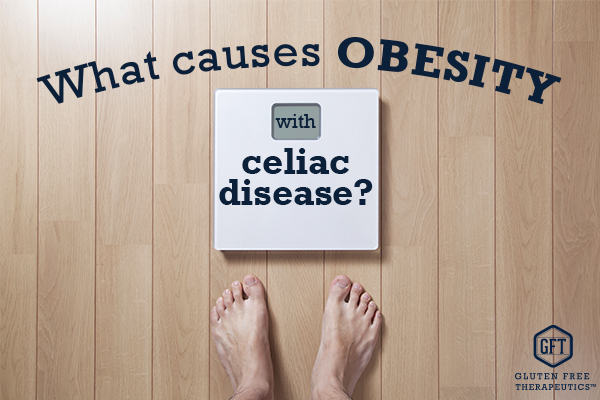
New Research Looks Into the Causes of Obesity with Celiac Disease
A few years ago, symptoms such as abdominal pain, frequent diarrhea and weight loss would set off alarm bells in most doctor’s heads for the possibility of a celiac disease diagnosis. In contrast, it would probably be the last condition on their mind when faced with overweight patients with no evident signs of malnutrition. However, as we learn more about the complexities of celiac disease we find that nowadays many patients present with a wide range of atypical symptoms seemingly unrelated to a disease affecting the digestive tract. One of these symptoms is obesity. Just what is the cause of obesity with celiac disease?
What’s more, not only it’s no longer uncommon for overweight or obese patients to be diagnosed with celiac disease, but a significant number of newly diagnosed celiac patients soon pile up the pounds once they start a gluten free diet. However, this association between increasing weight and celiac disease is a relatively new phenomenon and its clinical implications remain a mystery. At this stage, researchers don’t even agree whether it’s a consequence of the disease or a consequence of the treatment.
Obesity as a consequence of celiac disease: The “compensatory” hypothesis
Our bodies have this amazing ability to find alternative pathways if the original way is blocked. If this theory can be applied to celiac disease patients, it could mean enhanced nutrient absorption in areas of the intestine not severely affected, including changes in the intestinal wall and even increased villous height.
The fact that classic symptoms – including weight loss and malabsorption – are more common in babies and young children, whereas older children and adults are more likely to experience unusual signs seems to point in this direction. After all, this intestinal resilience and flexibility takes some time to develop, leaving very young patients unprotected and at risk of severe malabsorption.
Undoubtedly, this adaptation may be good news for patients at risk of malabsorption, resulting in restored nutrient levels accompanied by an increased energy intake. However, on the other extreme, in “overzealous” bowels, overcompensation could easily lead to excessive weight gain and obesity.
Obesity as a consequence of a gluten free diet: The “metabolic” link
On the other hand, some believe the problem is not the disease but the treatment! In this case, a gluten free diet may be to blame. This is the more common view among physicians. Several studies have shown that almost half the patients starting a gluten-free diet increase weight, particularly if they were already overweight before the diet.
The truth is that a gluten free diet was developed to reduce symptoms associated with celiac disease, not to solve other health issues such as obesity. In fact, it’s possible to follow a strict gluten-free diet in quite an unhealthy manner. Not surprisingly, the poor flavour of some gluten-free foods drives many patients, especially children and teenagers, towards fatty, sugary and highly processed substitutes. This inevitably leads to high energy intake and excess weight gain.
For some patients, however, this may be a losing battle whatever their choices. Even if following healthy options, there is evidence of a deep metabolic link between celiac disease and obesity. Most gluten-free foods cannot maintain high blood glucose levels for many hours, but instead only cause a brief burst after a meal. In addition, in a mechanism as yet to discover, a gluten free diet seems to be able to alter important hunger-regulating hormone levels. As a result, patients are likely to feel hungrier than before and inevitably eat more frequently throughout the day.
Conclusion
If you have experience weight gain with celiac disease you are not alone. For both conditions, a healthy diet is the best solution. As obesity in celiac disease patients becomes more prevalent, it’s essential to start following healthcare plans with appropriate assessments and monitoring by a dietician. Don’t be afraid to ask your doctor/dietician for more information about healthy options, including gluten free multivitamin supplements, before you see your waist expanding!
 This original article is made possible by Gluten Free Therapeutics. Our mission is to educate, inform, and provide the most effective nutritional products possible to allow those with celiac disease and serious gluten intolerances to heal their bodies. CeliVites complete line of superior gluten free supplements includes multivitamin/multimineral supplements, iron supplements, and calcium supplements for people living with celiac disease. All CeliVites products are designed to help you heal, restore and rebuild your body, because going gluten free isn’t enough!
This original article is made possible by Gluten Free Therapeutics. Our mission is to educate, inform, and provide the most effective nutritional products possible to allow those with celiac disease and serious gluten intolerances to heal their bodies. CeliVites complete line of superior gluten free supplements includes multivitamin/multimineral supplements, iron supplements, and calcium supplements for people living with celiac disease. All CeliVites products are designed to help you heal, restore and rebuild your body, because going gluten free isn’t enough!
REFERENCES
- Dickey W, Kearney N. Overweight in celiac disease: prevalence, clinical characteristics, and effect of a gluten-free diet. Am J Gastroenterol 2006;101:2356-2359.
- Bao F, Yu L, Babu S et al. One third of HLA DQ2 homozygous patients with type 1 diabetes express celiac disease-associated transglutaminase autoantibodies. J Autoimmun 1999;13:143-148.
- Kupper C. Dietary guidelines and implementation for celiac disease. Gastroenterology 2005;128:S121-127.
- Olen O, Montgomery SM, Marcus C et al. Coeliac disease and body mass index: a study of two Swedish general population-based registers. Scand J Gastroenterol 2009;44:1198- 1206.
- Reilly NR, Aguilar K, Hassid BG, et al. Celiac disease in normal- weight and overweight children: clinical features and growth outcomes following a gluten-free diet. J Pediatr Gastroenterol Nutr 2011;53:528-531.
- Venkatasubramani N, Telega G, Werlin SL. Obesity in pediatric celiac disease. J Pediatr Gastroenterol Nutr 2010;51:295-297.
- Cheng J, Brar PS, Lee AR, Green PH. Body mass index in celiac disease: beneficial effect of a gluten-free diet. J Clin Gastroenterol 2010;44:267-271.
- Tucker E, Rostami K, Prabhakaran S, Al Dulaimi D. Patients with coeliac disease are increasingly overweight or obese on presentation. J Gastrointestin Liver Dis. 2012 Mar;21(1):11-5.
- Sonti R, Green PH. Celiac disease: Obesity in celiac disease. Nat Rev Gastroenterol Hepatol. 2012 Apr 10;9(5):247-8.
- Kabbani TA, Goldberg A, Kelly CP et al. Body mass index and the risk of obesity in coeliac disease treated with the gluten-free diet. Aliment Pharmacol Ther. 2012 Mar;35(6):723-9
- Valletta E, Fornaro M, Cipolli M et al. Celiac disease and obesity: need for nutritional follow-up after diagnosis. Eur J Clin Nutr. 2010 Nov;64(11):1371-2.
Comments ()
















I fwas diagnosed 3 years ago. Since I went gluten free I have gained 10 pounds and having a really hard time to lose it. I have muscular dystrophy deases so I cannot afford the extra weight on the legs.
I was diagnosed with Celiac Disease in 2009 and I have been on gluten free diet for a while now. I have gained at least 40 pounds in the past 2 years from this diet. Its hard to lose it too.
This article caught my eye! I have been gluten free for at least 4 years now due to intolerance. I had a panel of food allergy tests recommended by my doctor to interpret my issues with “IBS” type symptoms. At first, I lost 10 lbs, due to diet changes and a lot of uncertainties. After educating myself with all the internet sites and books I could find, I found myself gaining weight thereafter. To date, I am 20 pounds heavier than when first diagnosed. (210 lbs) it is truly difficult to lose any body fat with various diets. The worst is my mid section – no wasteline and my stomach seems to always protrude like a beer belly, no matter what I do.
My 7yr old grandson has celiac since he was 4 thing is his other family is not feeding him GF foods. He has signs of celulite on his body. We are not sure if it is from the disease or the food his other family is feeding him
For about 15 years now, I have been dealing with issues causing my whole right abdomen side hurting into the middle front and middle to lower back. I have had blood testing done, colonoscopy and endoscopy done, CT scan, and x-ray done and I have had no clear diagnosis on me. I am so miserable with this pain especially after I eat anything. I have had my gall bladder removed also. One doctor told me that it was just a pulled muscle in my rib area and that is causing the pain. But I have so many of the symptoms of celiac disease. Should I have them perform a biopsy of my small intestine?
Please help as I am miserable!
Hello Stephanie,
Your medical history sounds very difficult. It looks like you have been looking for an answer for a while now. Your issues need to be evaluated by a doctor. For anyone to give you advice regarding your next step other than a trusted medical care professional is irresponsible. It is frustrating but please keep looking for a doctor that can help you. Perhaps you can find a good gastroenterologist in your area that helps celiac patients. The celiac foundation has a doctor referral link on their website. Perhaps that is a place to start.
Good luck, we hope you feel better.
Stephanie,
We share much of the same symptoms. I’ve seen all kinds of doctors and had all kinds of tests. I also have also had my gallbladder removed because I’ve had pain in that area for decades, but the pain got worse after the surgery. I’m taking Prevacid now and that *helps*. But I still have pain. I haven’t been tested for celiac disease, but I will as soon as i have the money for the tests. I hope you find your answers soon. I just wanted you to know you’re not alone.
Testing for celiac disease can be fine through a blood test. Particular things stick out to a good doctor when looking for this and then get a proper endoscopy done to prove it. Without proper diagnosis you might just be eating your way to having stomach cancer . This is a result of a true celiac desease if you do not stick strictly to the diet. I also have my gall bladder removed and continuous stomach upsets as a child only to find out later these are warning signs of celiac desease.